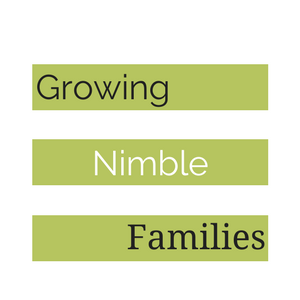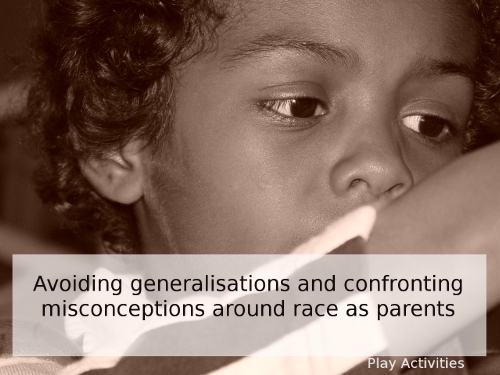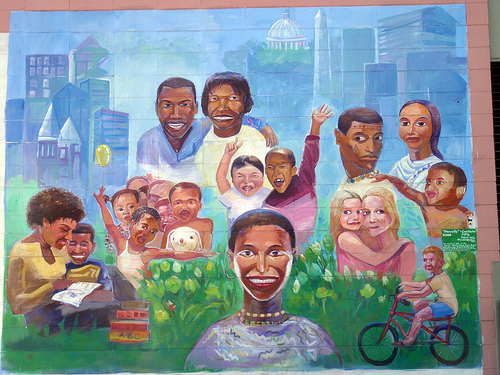No matter where we live we must as parents prepare our children for living in a diverse world. If you live in a diverse place conversations maybe easier to start but the majority of us live and move in circles where this is just not true.
We may argue that we see diversity in our media especially in children’s programming they see it and we don’t need to explicitly raise it. Vittrup did an interesting study on this that was reported in Nurtureshock and Newsweek. It cautions our use of “Everyone is equal” as a too general for children to understand about race. We do need to be more explicit about race; however charged the topic maybe.
We all want our children to be unintimidated by differences and have the social skills to integrate in a diverse world. The question is, do we make it worse or do we make it better, by calling attention to race?
Nurtureshock- Po Brosman and Ashley Merryman: Chapter 3
Vittup gives a really interesting interview that’s worth reading.
Young children (e.g., preschoolers) see skin color differences as well, but they do not yet attribute the meaning to race and skin color as adults do. To them it is simply a physical characteristic they are noticing. When they are young, children learn which differences are important in categorizing people and which aren’t…….
So around the ages of 3-5 children develop racial awareness where they are able to recognize racial differences, label the differences, and categorize themselves within a racial group……
After they develop awareness, they develop “racial orientation,” which is when the first positive and negative attitudes about racial groups show up. These are sometimes referred to as “embryonic racial attitudes” and they generally become present around the ages of 3-6. These two phases form the foundations of later racial attitude development……..
Many parents are under the assumption–naïve as it may be–that by not talking about race, children will grow up to be colorblind. Unfortunately, our society is not colorblind, so without parents mediating and explaining to children what they are seeing, hearing, and experiencing, children are pretty much left to their own devices to figure everything out……….
It is vitally important that parents have more explicit conversations with their children–focusing on diversity, equality, respect, and importance across all racial groups–as well as teach them media literacy skills. Teaching them to critically evaluate what they see on television (or video games, computers, etc.) and make them realize that the world of television is not necessarily representative of the real world.
Full interview: Interview with birgitte-vittrup on Racebending.com
Another problem is even if you live in a diverse neighbourhood often we believe the immersion will do the talking for us. Maybe for you it is a diverse school, church or club. They will be exposed to racial conversations because of a cultural holiday like Martin Luther King day or month long celebration Asian heritage month. Not necessarily so.
Race is a complex issue with no one way forward. As a parent though I need to see how I am contributing to their racial knowledge. How am I challenging and encouraging? When do I need to remain silent and speak up?
10 Things we can do
- Read NurtureShock: New Thinking About Children
: Chapter 3
- Review the books in our children’s library do they reflect our society?
- Investigate books which show a diversity of characters
- Watch: Kids speak their minds about race
- Watch : A Look at Race Relations through a Child’s Eyes
- Follow this board for ideas of books
- Seek our different perspectives by following blogs where families have interracial children or have adopted children from a different race.
- Create times and opportunities to talk about race on your terms
- Make a craft.
- Find suggestions from friends like crafty moms share Mamasmiles and Adventures in Mommydom
I hope this post has done more than stir up negative emotions. I hope it encourages discussion and helps us all to look at ourselves. What can we do next?
What book have your read or seen that shares a diverse character or characters? Let’s share our favourite diversity books in the comments
Thanks for reading.













This is an excellent post, Melitsa – and so important!
Mary Hoffman’s “Princess Grace” is a great one about diversity for little girls.
Adding it to my list. I think the boys will like it. They like Amazing Grace.
Great post. I just thought of something, there’s a blog called “Brown Like Me,” that focuses on showcasing books with African Americans as the main character. She started it after her daughter asked why none of the characters were “brown like me?”
I’ve struggled with this issue at times because I was trying to bring forth all parts of our history and show how African Americans had overcome many different things, but my kids hadn’t put it in the context of history so they were confused at first thinking some of the books we read still were going on. I’m still figuring how how to best work on that………
I’ll have to look that blog up. Thanks for the suggestion.
Time is such a difficult concept for the young ones. Personally, I try and share good stories past and present about a racial group to give them more than one thing to think about a racial group. It can be really hard otherwise. Even young elementary children have problems with Ancient Greeks and Modern Greeks ( talking from experience….) For me the point though is the discussion. We don’t have all the answers and in talking about it and saying it makes all the difference.
Great post! We live in a very diverse area, so my children have seen people of color since they were born. Just now (at ages 6 and 4) have they really started to see the differences and have innocently made some comments that could be offensive. I have been looking for things to do that will actually teach them more about race in an appropriate way. Thanks for the resources!
Being in a diverse area can really help depending on what you do. Thanks for replying.
They were both really interesting reads and makes total sense. Exposure doesn’t = understanding. Conversation does 🙂
Have always been open about race in my family; ie explaining when my kids have questions. Honestly. They are awesome kids with friends of many different colors. Don’t dance around the race issue, it only does your kids a disservice.
Totally agree Kat. It’s great to see more modeling this type of behavior.